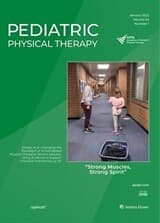Science
1. Validity of the Early Activity Scale for Endurance and the Six-Minute Walk Test for children with cerebral palsy Two well known tests of function in children with cerebral palsy: the Early Activity Scale for Endurance—EASE—and the Six-Minute Walk Test have been compared in a validation study for assessing children with cerebral palsy by functional ability level, sex, and age. The author of a new research paper in Pediatric Physical Therapy journal—Alyssa LaForme Fiss—tells the podcast about her findings. INTERVIEWEE: Alyssa LaForme Fiss, PT PhD PCS, Associate Professor, Director of Physical Therapy Research, Mercer University, Atlanta, Georgia CO-AUTHORS: Lynn Jeffries, Allison Yocum and Sarah Westcott McCoy 2. Effects of adaptive bungee trampolining for children with cerebral palsy: a single subject study Since most children enjoy jumping on a trampoline this has been investigated as a therapy for children with cerebral palsy in research published in Pediatric Physical Therapy. Author Ashleigh Germain from Australia tells the podcast how she and her colleagues at Curtin University in Perth assessed the effects of using an adapted trampoline with an added “bungee” harness to protect the children. INTERVIEWEE: Ashleigh M Germain, Curtin University of Technology, Western Australia, Australia CO-AUTHORS: Marie Blackmore, Noula Gibson, Becky Newell and Sîan A Williams 3. Early intervention and postural adjustments during reaching in infants at risk of cerebral palsy A program known as COPCA (COPing with and CAring for infants with special needs) developed in the Netherlands has been trialed for early intervention in infants at high risk of cerebral palsy. Mijna Hadders Algra, from Groningen tells the podcast how babies’ reaching behavior gave important insights into care in an investigation of the postural effects of a family-centered program applied at 3-6 months corrected age in infants at high risk of cerebral palsy. INTERVIEWEE: Mijna Hadders-Algra MD, Professor of Developmental Neurology, University Medical Center, Groningen, Netherlands CO-AUTHORS: Lieke C. van Balen, Linze-Jaap Dijkstra,Tineke Dirks, Arend F. Bos 4. Cardiopulmonary Exercise test using arm ergometry in children with Spina Bifida: a prediction model An equation to help physical therapists optimize the physical development of patients with spina bifida—while avoiding exacerbating co-morbidities—has been developed in Brazil. The podcast hears from Ana Claudia Mattiello Sverzut—author of a study aimed at developing a prediction model for peak oxygen uptake in children with spina bifida—considering peak work load, peak heart rate, age, sex, anthropometric measures, walking level. INTERVIEWEE: Ana Claudia Mattiello Sverzut PT PhD Physical Therapy Professor, Ribeirão Preto Medical School, University of Sao Paulo, Sao Paulo, Brazil CO-AUTHORS: Jana A.M. Tuijtelaars¬, Marisa Maia Leonardi-Figuiredo, Julio Crescencio, Lourenço Gallo Junior, Edson Zangiacomi Martinez, Manon Bloemen, PT, Tim Takken 5. Functional task training combined with electrical stimulation improves motor capacity in children with unilateral cerebral palsy: a single-subject design Electrical stimulation was found to be an important method of improving motor capacity for children with unilateral cerebral palsy in some more research reported from Brazil. In the podcast Rejane Vale Gonçalves discusses her group’s investigation of whether gastrocnemius FES combined with training of functional tasks produced improvements in variables related to walking performance, capacity for propulsive force generation and changes in gross motor function of children with SUCP INTERVIEWEE: Rejane Vale Gonçalves, PT PhD, Physical Therapy Professor, Faculdade de Ciências Médicas, Belo Horizonte, Brazil CO-AUTHORS: Sérgio Teixeira Fonseca, Priscila Albuquerque de Araújo, Thales Rezende Souza, Renan Alves Resende and Marisa Cotta Mancini

